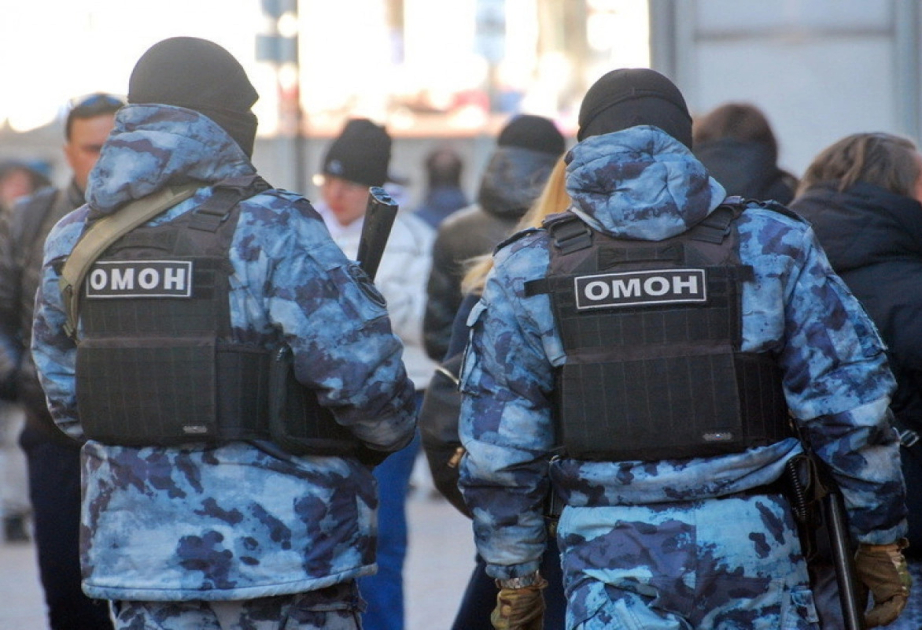Operation ‘Sputnik Azerbaijan’: A new spike in tensions with Russia
Arrest of Sputnik Azerbaijan staff
Azerbaijan’s Ministry of Internal Affairs has raided the Baku office of Sputnik Azerbaijan, a Russian state-run news agency. Pro-government media claim that some of those detained are linked to Russia’s Federal Security Service (FSB).
The raid, carried out on 30 June, led to the detention of two senior staff members — editor-in-chief Igor Kartavykh and managing editor Yevgeny Belousov.
According to an official statement from the ministry, the operation was based on “intelligence indicating that the agency continued operating with illegal funding despite its accreditation being revoked.”
In total, seven people were detained. Two of them were formally arrested, while the other five face criminal charges.
Kremlin spokesperson Dmitry Peskov said Moscow plans to raise the issue of the detained Sputnik Azerbaijan staff with officials in Baku.
“We hope that through direct talks with the Azerbaijani side, we can secure their release in the near future,” Peskov said.
But the reasons behind the incident — along with the way it’s being reported — suggest this is not just a legal matter. It also carries political, diplomatic, and geopolitical implications.
Accreditation dispute
Back in February, Azerbaijan’s Foreign Ministry revoked the accreditation of Sputnik Azerbaijan. The official reason cited was “the principle of mutual parity in the media sphere” — meaning the number of Russian journalists working in Baku should match the number of staff from Azerbaijan’s state news agency AZERTAC based in Russia.
Despite the loss of accreditation, Sputnik Azerbaijan continued operating as usual. Staff kept coming to work, and the newsroom remained fully functional.
Allegations of FSB ties
In the early stages of the operation, pro-government Azerbaijani media claimed that the detained staff were linked to Russia’s Federal Security Service (FSB). However, Sputnik later denied these allegations, insisting the detained were journalists simply doing their jobs.
Following the incident, Azerbaijan’s ambassador to Russia, Rahman Mustafayev, was summoned to the Russian Foreign Ministry. The Kremlin, meanwhile, issued a brief and diplomatic response:
“We remain committed to developing our relationship with Azerbaijan. We regret the decisions Baku has made following the events in Yekaterinburg.”
Against the backdrop of Yekaterinburg
The incident comes amid a wave of police raids in Yekaterinburg targeting people of Azerbaijani origin, which have been widely condemned for serious human rights abuses.
During the raids on 27 June, several Azerbaijani nationals were killed. Dozens more were detained and reportedly subjected to violence. According to the Safarov family, police resorted to tasers, physical violence, and degrading treatment.
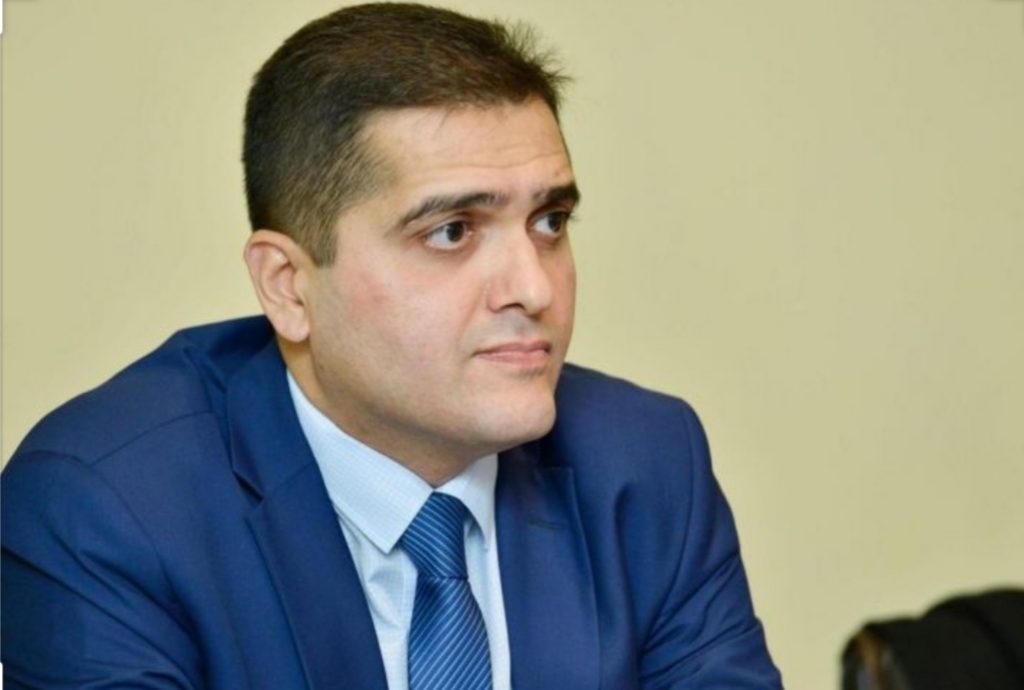
Political analyst Elkhan Shahinoglu says that in the wake of these events, Kremlin-affiliated media have ramped up pressure on Azerbaijan.
According to him, pro-Russian outlets portray Azerbaijan’s response to the Yekaterinburg raids as “hostile behaviour” and openly float threats — including restricting agricultural exports and tightening migration policies.
“There is a way out of this situation,” Shahinoglu says. “If the Kremlin launches an investigation into the police violence in Yekaterinburg and arrests those responsible for killing our compatriots, tensions could ease — at least partially.
“But it’s hard to expect that outcome. Kremlin media continue spreading false claims that our compatriots died of heart attacks, and that those detained were involved in criminal activity in Yekaterinburg. In such conditions, it’s unlikely the Kremlin will admit the truth — just as it didn’t with the plane.”
- Why Azerbaijan-Russia ties have cooled — and what comes next
- Азербайджано-российские отношения: как сбитый самолет привел к геополитическому конфликту
- Opinion: By calling Karabakh ‘disputed’, Kremlin signals Baku to recognise Crimea as Russian
Arrest of ‘agents’
The arrests triggered a mixed reaction both among legal experts and the wider public.
Lawyer Emin Aslanov notes: “When the judiciary and investigative bodies are not independent, then whether or not the detainees are FSB officers is irrelevant — any politically motivated detention falls under the category of a political imprisonment.”
Social media users reacted more harshly. Some users called the arrest of the journalists — labelled as “agents” — a purely symbolic gesture. They point out that for years, Azerbaijan’s highest-ranking officials included people who were awarded medals and honours by Russia and maintained close ties to the Kremlin’s political orbit.
Among those frequently mentioned are Ramiz Mehdiyev, former head of the Presidential Administration; Yagub Eyyubov, first deputy prime minister; Sahiba Gafarova, speaker of the Milli Majlis (parliament); and Ramil Usubov, secretary of the Security Council and former interior minister.
Many also recall that Heydar Aliyev was a KGB general who rose to power with Moscow’s backing — and that the Aliyev family remains closely tied to the Kremlin to this day.
Shutting down Radio Liberty: Same playbook, different target?
The actions taken by Azerbaijani authorities against the Russian media outlet have drawn comparisons to the closure of Radio Free Europe/Radio Liberty in 2014. Back then, on 26 December, the General Prosecutor’s Office raided the Baku bureau, forced staff out, seized equipment and documents, and sealed the office.
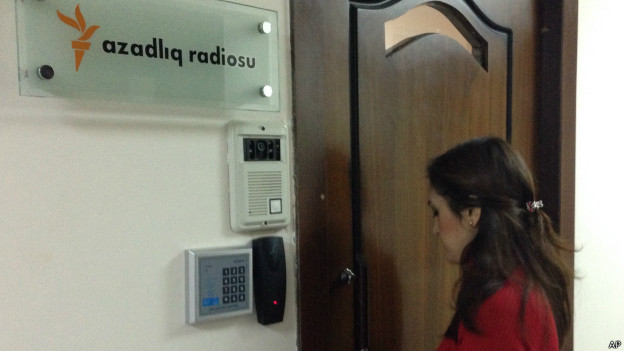
A few months later, the Radio Liberty office was allowed to reopen — but its equipment and documents were never returned.
Shortly before the raid, investigative journalist Khadija Ismayilova was arrested. She was known for her corruption investigations that named President Ilham Aliyev and members of his family.
Nenad Pejic, then editor-in-chief of Radio Free Europe/Radio Liberty, responded at the time:
“All charges must be dropped, and Khadija must be released immediately. The radio’s work was entirely legal. Law enforcement is simply trying to silence the truth.”
These parallels suggest that the operation against Sputnik Azerbaijan may have less to do with journalism itself — and more to do with sending a political message as part of an ongoing information war.
Tensions escalated after the AZAL plane incident
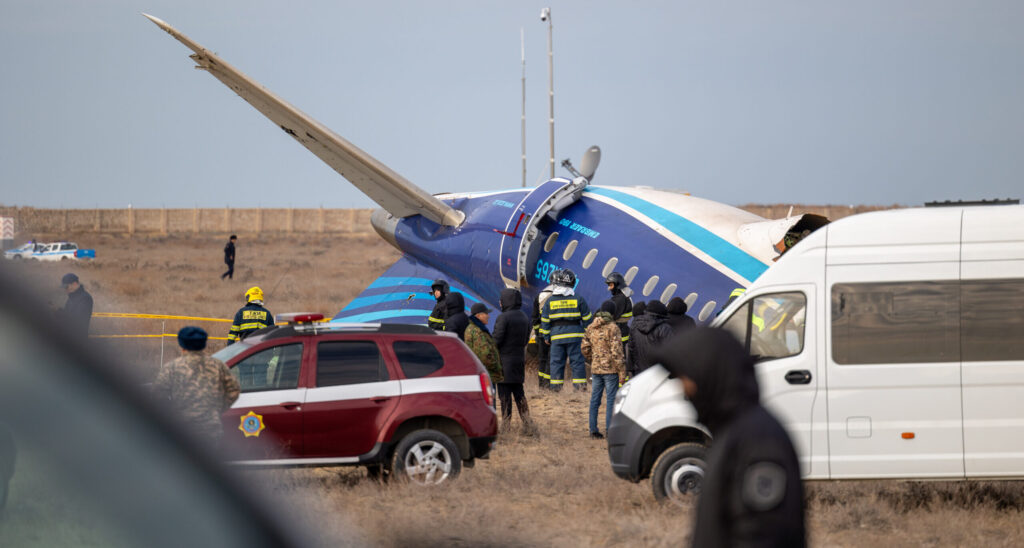
On 25 December 2024, a passenger plane operated by AZAL was shot down by Russian air defence systems. The incident, which killed 38 people, sparked a wave of outrage across Azerbaijani society and political circles.
President Ilham Aliyev responded sharply:
“The Russian side must apologise to Azerbaijan… and pay compensation to the state, as well as to the injured passengers and crew members. These are our conditions.”
Three days later, Russian president Vladimir Putin offered an apology in a phone call, saying the “incident happened in Russian airspace.” But Azerbaijan’s demands — compensation and holding those responsible accountable — were never met.
In the immediate aftermath, Azerbaijani media leaned towards the narrative of an “unknown cause.” But once it became clear that responsibility lay with Russia, the tone shifted dramatically. State-controlled TV channels, which rarely take such a harsh stance, began airing unusually strong statements:
- AZTV: “Instead of acknowledging responsibility, the Russian side resorts to threats through the media, insults, and summoning our ambassador to the Foreign Ministry.”
- İctimai TV: “Azerbaijan is preparing to file a lawsuit against Russia in an international court. We are also increasing pressure on Moscow.”
- İctimai TV: “Relations between Russia and Azerbaijan are going through their most tense period in 30 years.”
- İctimai TV: “There has never been a consistent or clear attitude towards Azerbaijan within the Russian government.”
- İctimai TV: “Frankly, we never expected anything constructive from Moscow.”
The incident marked the first serious rupture after a long period of silence in Azerbaijan–Russia relations. The cancellation of cultural events following the Yekaterinburg raids, the operation against Sputnik Azerbaijan, and other recent steps are now seen as part of a broader diplomatic rupture.
Presidential plane and GPS blackouts: Part of a bigger picture?
On the same day the AZAL passenger plane was shot down, the official aircraft carrying Azerbaijan’s president experienced technical interference while flying through Russian airspace en route to an informal CIS summit in St Petersburg.
The incident became a subject of public discussion after an official statement indirectly confirmed it, backed by Azerbaijan’s Ministry of Digital Development and Transport.
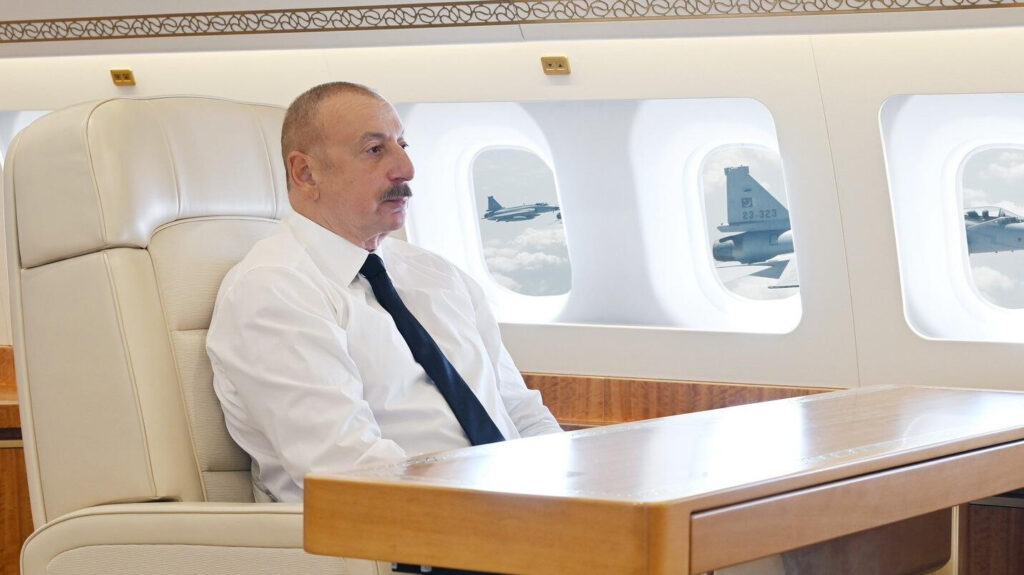
According to reports in Azerbaijani media, president Ilham Aliyev’s plane lost its GPS signal mid-flight and, facing radio navigation issues, was forced to abruptly return to Baku.
On the same day, a similar issue affected AZAL flight J2-8243, which also lost navigation capabilities while flying over Russian airspace. The plane was effectively “blinded” over Chechnya and the North Caucasus and was ultimately forced to divert to Kazakhstan.
Azerbaijani sources claim that the aircraft was targeted by a Pantsir-S1 surface-to-air missile system, while Russian forces activated a response protocol known as “Kover” (“Carpet Plan”) at 05:21. Under this protocol, all civilian flights in the region were temporarily restricted. It remains unclear whether the Azerbaijani pilots were warned in advance.
The news agency Turan published an in-depth investigation into the incident in January 2025, detailing the background of the aviation crisis, the activation of the “Kover” protocol, and GPS interference in Russian airspace. However, the article was later removed from the website following the Russian apology.
Shortly after the publication, Turan’s editor-in-chief, Mehman Aliyev, was summoned by the State Security Service. A few days later, the agency announced it was suspending its operations, officially citing “financial reasons.”
Legal action or geopolitical message?
The operation against Sputnik Azerbaijan isn’t the first time that a media outlet tied to a foreign government — along with its staff — has come under pressure in Azerbaijan. But the key question remains: is this really about espionage, a push for media parity, or a geopolitical balancing act?
The mix of conflicting statements, denials, and diplomatic exchanges suggests that this is about more than press freedom or illegal activity. It reflects deepening tensions and growing mistrust between Russia and Azerbaijan.
What now awaits those arrested under the pretext of being “agents”? Will the fate of Azerbaijani citizens tortured and killed in recent incidents take priority — or will fragile diplomatic balance win out?
History shows that for both governments, the lives of ordinary citizens have rarely been a priority.
News in Azerbaijan










